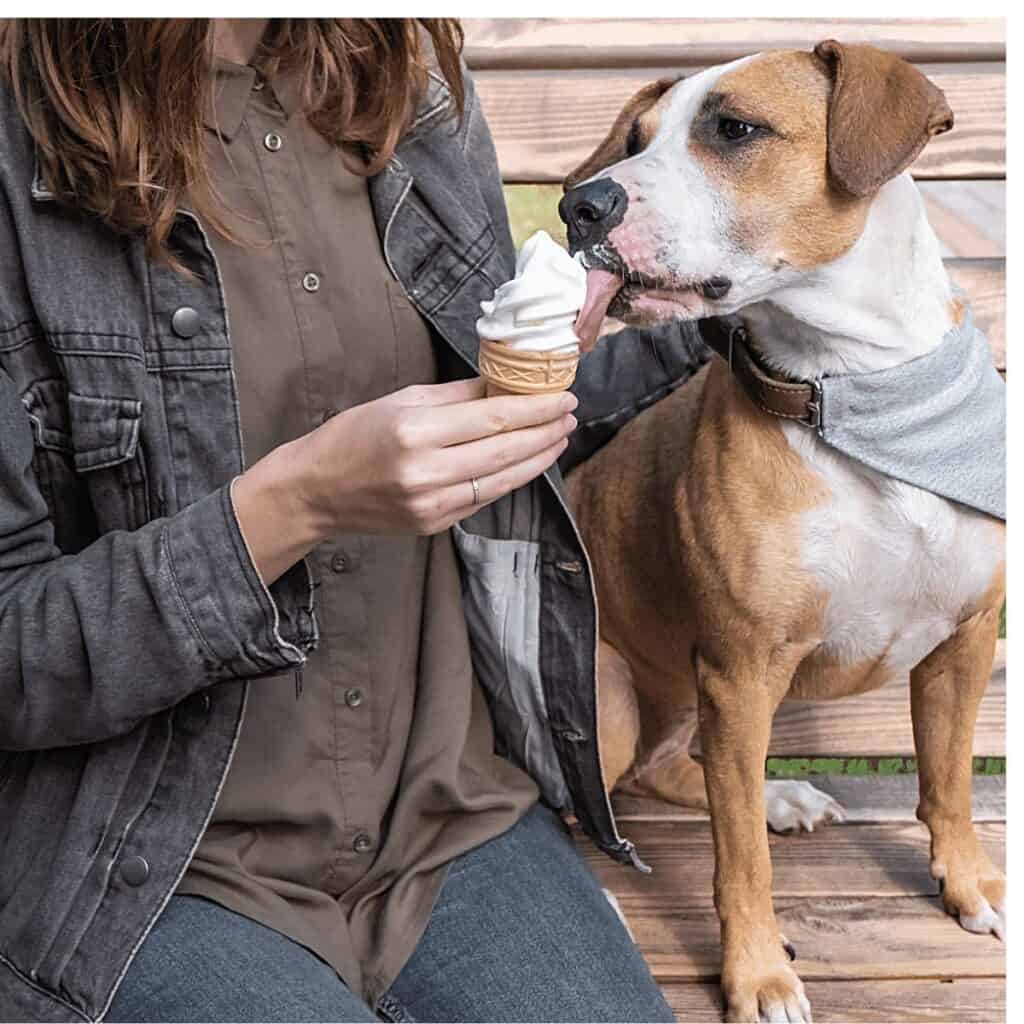If you are wondering ice cream is bad for dogs, the answer is that yes it can be. However, read on for some quick tips on how you can still share an ice cream with your dog safely with your dog’s needs in mind. Also learn about dog ice cream alternatives that may be easier and more enjoyable for you and your dog.

My parents routinely drove through the McDonalds drive through and ordered ice cream cones for each of their Great Danes but although enjoyable this may not be the healthiest option for dogs to cool off. Dogs love a cool treat but depending on the ice cream you select there are some things you may want to consider.
Is Ice Cream Bad for Dogs?
Ice cream if made and prepared in a certain way may be okay for your dog. However, most ice cream contains some dangerous ingredients for dogs. Dog lovers should be aware of these ingredients or avoid giving ice cream to their dogs unless in small amounts or for the occasional treat on a hot day. Swapping out certain ice creams with some other alternatives may be the best idea.

Ice Cream Ingredients for Dogs to Avoid
1) Lactose.
Ice Cream is a dairy product and therefore contains lactose. Many dogs, like people, are lactose intolerant. The Dog Food Advisor, the online authority for dog food, reports that dogs can’t produce their own digestive enzymes lactase.
Lactase is what allows people and dogs to digest lactose in dairy products. Without this critical enzyme, a dog’s stomach cannot digest dairy products. It’s this inability to produce lactase that causes the infamous digestive condition known as lactose intolerance.
Given that ice cream is one of the highest lactose containing dairy products, if you want to avoid any digestive issues in your dog you should avoid high lactose ice cream.
New options of ice cream are available that are lactose free or contain less lactose if you are really thinking that your dog needs a special cool dairy treat.
2) Artificial Sweeteners.
Certain sugar substitutes, like xylitol, are dangerous to dogs and can be toxic. It is a good idea to avoid ice cream for these ingredients that are not necessarily meant for dogs but better left for humans in human foods (although xylitol is reported to also cause stomach distress in humans as well.)
3) Chocolate
We already know that chocolate, especially dark chocolate, can be toxic to dogs (read more in in our article Chocolate Toxicity in Pets and Chocolate Toxicity Calculator. Chocolate ice cream and any ice cream with chocolate flavoring, chunks or syrups should be avoided due to its toxicity for dogs.

4) Other Toxic Ingredients to Dogs.
Many people avoid peanut butter for dogs due to the probability that it may contain xylitol. However, we love peanut butter for dogs and include it in some of our favorite recipes as when using it with dogs you would likely and can easily review the ingredients to ensure that the peanut butter is safe and natural.
However, when peanut butter is included in ice cream it may not be so easy to tell. Accordingly, it is likely best to steer clear of ice cream and especially ice cream with peanut butter flavoring.
5) Macadamia Nuts.
Macadamia nuts are another common ingredient in ice cream flavors and according to the ASPCA Macadamia nuts are toxic to dogs. Your pup would only need to eat a small amount of food containing these nuts to experience negative results.
According to the ASPCA, dogs who eat macadamia nuts most commonly experience weakness in the back legs, vomiting, upset stomach, loose stools, and diarrhea. Experts at the ASPCA Animal Poison Control Center (APCC) say that in most cases, these negative effects are mild and can be managed at home with a little guidance from a veterinary professional. But in more serious cases, the side effects can require veterinary care.
5) Sugar.
Too much sugar can do the same thing to dogs that it does to people. High blood sugar levels due to high sugar content in ice cream can make your dog overweight and cause problems with their teeth. It can even lead to diabetes says WebMD. Since ice cream has about 14 grams of sugar in 1/2 cup it is best to steer clear of large amounts of ice cream for your dogs for that reason alone.
Added to that the high prevalence of adult dogs with diabetes and the increased difficulty of older dogs processing sugar and having difficulty with weight gain and weight management it is best to select another way to satisfy your dog with a cool treat in the summer.
Alternatives to Ice Cream for Dogs (including dog DIY Ice Cream)
1) Dog Ice Cream.
There are several companies, including famous Ben and Jerry’s that have provided innovative dog-friendly ice cream frozen treat offerings for pets which is a far better option for dogs and a dog’s stomach than ice cream for humans.

2) Bone Broth Shaved Ice.
One of my favorite treats for dogs whether poured over their dinner or frozen in ice cube trays or poured over ice itself is bone broth. Full of collagen and healthy amino acids it is a win for young and elderly dogs alike. Check out our bone broth recipe here.
3) Plain vanilla ice cream (preferably lactose free or reduced lactose)
Although lactose may still cause an issue for dogs having a tiny amount of plain vanilla ice cream may provide a refreshing treat for dogs without an issue. With plain vanilla you can be certain that most of the dangerous issues with ice cream are avoided (except for the lactose) but your dog’s stomach is likely okay with small amounts.
4) Frozen Pureed Fruits and Vegetables
Vegetables and fruit pureed in a food processor or immersion blender and then frozen may be a refreshing treat for your dog. Once pureed you can freeze the puree in a Kong or a ice cube tray and give as a treat whenever you want.
All of our Kong recipes can be frozen for later and provide a great afternoon snack for your dog.
5) Plain Yoghurt or Kefir Ice Cream.
According to Healthline, kefir and yoghurt are lower in lactose than other milk products due to the lactic acid bacteria in fermented dairy foods — like kefir and plain yogurt — turning the lactose into lactic acid.
This makes yoghurt and kefir in a homemade ice cream a nice creamy alternative to traditional ice cream which will be easier on your dog’s stomach while still allowing them to enjoy a frozen treat.

With so many fun options to offer your dog a frozen treat there really is no need to share large quantities of ice cream with your dog. Added to that the issues that ice cream may cause your dog, especially small dogs or dogs that have health problems, sensitive stomachs, are elderly dogs or prone to diabetes and need fewer calories, those options seem even more of a smarter choice for a healthy treat for your dog.
Even for people, ice cream is a special treat and too much ice cream can be difficult to manage so imagine the impact on your dog!
Check out Motherpuppin’ Adorable: What to do when your dog is better than everyone else’s for more dog fun and tongue and cheek advice for navigating life with your dog!
Did you Enjoy this? Pin it
Dog Ice Cream FAQs
Dog ice cream has variations of most loved ingredients in ice cream made for humans, for instance, typical recipes will have less sugar, less lactose, and avoid known harmful ingredients to dogs such as chocolate and macadamia nuts. Instead producers use less milk based products.
If you make homemade ice cream for dogs it will be good for dogs. Making homemade ice cream for dogs entails leaving out high lactose and using lower lactose kefir or yoghurt, and leaving out dangerous dog ingredients like macadamia nuts and peanut butter with xylitol and chocolate.
Dogs can have ice cream that is free if dangerous ingredients like chocolate, xylitol and high lactose. Dogs are lactose intolerant so choosing ice cream with lower lactose is good.

